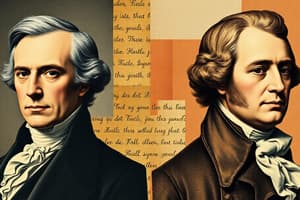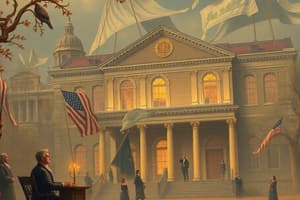Podcast
Questions and Answers
Which of the following statements accurately describes the significance of the Marbury v. Madison case?
Which of the following statements accurately describes the significance of the Marbury v. Madison case?
- It resolved a dispute over the appointment of a Justice of the Peace, but had little impact on the balance of power in the government.
- It led to a significant expansion of the powers of the executive branch at the expense of the judiciary.
- It solidified the Federalist party's dominance in the government by upholding the legitimacy of their appointments.
- It established the principle of judicial review, giving the Supreme Court the power to declare laws unconstitutional. (correct)
What was the main purpose of the Monroe Doctrine?
What was the main purpose of the Monroe Doctrine?
- To prevent European colonization in the Americas. (correct)
- To expand American territory into Central and South America.
- To establish a strong alliance between the United States and Great Britain.
- To promote free trade between the United States and European nations.
In the 1808 election, which candidate carried the Southern states?
In the 1808 election, which candidate carried the Southern states?
- James Madison (correct)
- DeWitt Clinton
- George Clinton
- Charles Cotesworth Pinckney
Who was Thomas Jefferson's running mate in the 1804 election?
Who was Thomas Jefferson's running mate in the 1804 election?
What was a major consequence of the War of 1812?
What was a major consequence of the War of 1812?
Which of these economic policies was NOT a part of the American System?
Which of these economic policies was NOT a part of the American System?
In which election did Andrew Jackson win the majority of the popular vote but not the presidency?
In which election did Andrew Jackson win the majority of the popular vote but not the presidency?
According to the US Constitution, what happens when no candidate receives the required number of electoral votes for the presidency?
According to the US Constitution, what happens when no candidate receives the required number of electoral votes for the presidency?
The Missouri Compromise aimed to resolve what major issue facing the young nation?
The Missouri Compromise aimed to resolve what major issue facing the young nation?
What was the alleged 'corrupt bargain' in the 1824 election?
What was the alleged 'corrupt bargain' in the 1824 election?
Flashcards
Election of 1804
Election of 1804
Thomas Jefferson won against Charles Cotesworth Pinckney with 162-14 electoral votes.
James Madison's Elections
James Madison's Elections
Madison won elections in 1808 and 1812, showing strong southern support.
Corrupt Bargain of 1824
Corrupt Bargain of 1824
Andrew Jackson had majority votes, but John Quincy Adams was elected after a House decision.
Election of 1816
Election of 1816
Signup and view all the flashcards
Thomas Jefferson's Vice President
Thomas Jefferson's Vice President
Signup and view all the flashcards
Marbury v. Madison
Marbury v. Madison
Signup and view all the flashcards
Louisiana Purchase
Louisiana Purchase
Signup and view all the flashcards
War of 1812
War of 1812
Signup and view all the flashcards
Missouri Compromise
Missouri Compromise
Signup and view all the flashcards
Monroe Doctrine
Monroe Doctrine
Signup and view all the flashcards
Study Notes
Jefferson Presidency
-
Marbury v. Madison: A legal conflict stemming from "midnight appointments" led to the principle of Judicial Review, where the Supreme Court can deem laws unconstitutional.
-
Louisiana Purchase: Acquired from France for $15 million, a bargain for the vast territory.
Unity and Sectionalism
-
Expansion of Federal Government Powers (War of 1812): The war demonstrated the US's strength and ability to act independently. Andrew Jackson played a role in the conflict.
-
End of Federalist Party: Though some Federalist ideas continued, there was a shift away from their name and party structure.
-
The American System (Henry Clay): Aimed to stabilize the US currency and facilitate trade through infrastructure projects.
-
Second Bank of the US: Created to stabilize the national currency (important after the War of 1812 instability).
-
Tariffs: Used to generate revenue.
-
Building Infrastructure: Roads, bridges, and canals built to foster internal trade.
-
Sectionalism: Regional divides emerged between the North (industry/trade) and South (agriculture/slavery).
Missouri Compromise
-
Slavery as the Central Issue: The Missouri Compromise struggled to resolve the disagreements about slavery's expansion.
-
Henry Clay's Involvement: Clay played a key role in crafting the compromise.
-
Unsatisfactory Solution: The Missouri Compromise was not a complete resolution to slavery issues.
-
Statehood Outcomes: Missouri became a slave state, Maine a free state, and slavery was prohibited above the 36°30' latitude line in the Louisiana Purchase territory.
Monroe Doctrine
-
Purpose: To prevent European interference in the Americas.
-
Europe's Role: European nations were to stay out of the Americas, and the US would not interfere in European affairs.
Elections
-
1804 Election: Thomas Jefferson (Democratic-Republican) won overwhelmingly against Charles Cotesworth Pinckney (Federalist)
-
1808 Election: James Madison (Democratic-Republican) won against Charles Cotesworth Pinckney (Federalist)
-
1812 Election: James Madison (Democratic-Republican) won against DeWitt Clinton (Federalist).
-
1816 Election: James Monroe (Democratic-Republican) won decisively against Rufus King (Federalist).
-
1824 Election ("Corrupt Bargain"): Andrew Jackson won the popular vote, but no candidate achieved a majority in the Electoral College. The House of Representatives selected John Quincy Adams, apparently in a deal with Henry Clay, leading to accusations of corruption.
Studying That Suits You
Use AI to generate personalized quizzes and flashcards to suit your learning preferences.




